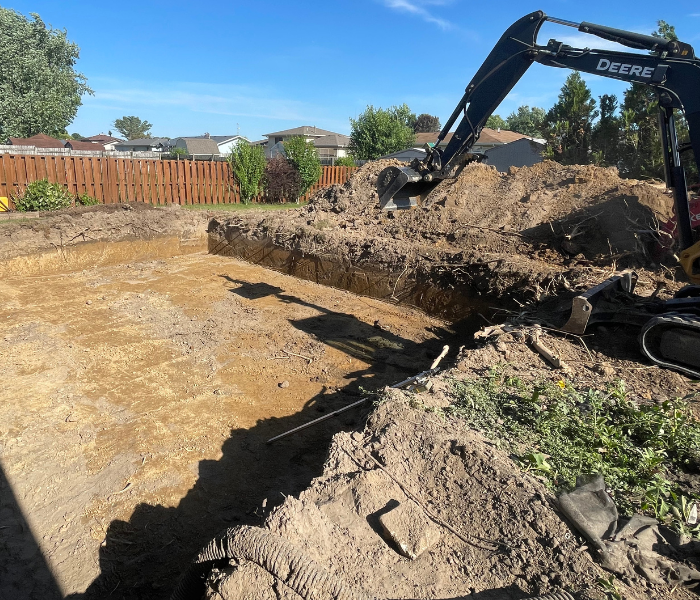Lancaster Excavation - Specialist Excavation Services in Lancaster, OH
Lancaster Excavation - Specialist Excavation Services in Lancaster, OH
Blog Article
Comprehensive Excavation Strategies: Understanding the Basics for Success
The careful preparation, accurate execution, and meticulous interest to detail called for in excavation jobs demand a detailed strategy that incorporates numerous fundamental elements. The real proficiency exists not just in recognizing these principles but in seamlessly integrating them to navigate the intricacies of excavation projects with skill.
Recognizing Excavation Project Preparation

The preliminary phase of any type of excavation task is the planning stage, where critical decisions are made that can considerably influence the result of the job. Understanding the project scope, timeline, and spending plan restrictions is essential for developing a thorough excavation strategy that guarantees the project's success.
One trick facet of excavation task preparation is the advancement of a thorough timeline that outlines the sequence of landmarks, target dates, and activities. By meticulously considering all these aspects throughout the planning stage, excavation jobs can be carried out successfully and successfully, leading to effective end results - lancaster trenching.
Dirt Evaluation and Site Examination
Carrying out thorough dirt evaluation and website assessment is an important action in the prep work stage of any kind of excavation task. Dirt analysis involves identifying the composition, framework, and residential or commercial properties of the soil at the excavation website. This details is vital for comprehending the soil's bearing capacity, dampness material, and capacity for erosion, which are vital aspects in figuring out the excavation methods and equipment required for the job.
Site analysis goes past dirt analysis and encompasses a more comprehensive analysis of the total website conditions. This analysis includes recognizing any type of potential hazards, such as below ground utilities, environmental concerns, or unstable surface, that could influence the excavation process. By extensively examining the site, task managers can create efficient excavation strategies that focus on safety, performance, and environmental management.
Utilizing advanced innovations like ground-penetrating radar, dirt sampling, and drone studies can enhance the precision and effectiveness of dirt analysis and website examination. Investing time and sources in these initial steps can inevitably save time and stop costly hold-ups or complications during the excavation procedure.
Equipment Choice and Utilization
Effective excavation tasks rely heavily on critical equipment option and utilization to make certain optimal performance and performance. Selecting the ideal tools for the job is critical in optimizing efficiency and reducing downtime. Factors such as the sort of dirt, depth of excavation, and project range play a substantial role in identifying one of the most ideal equipment for the task available.

Along with picking the proper devices, appropriate application is vital to task success. Operators has to be educated to handle the equipment securely and successfully - lancaster excavation. Normal upkeep checks and timely repair services help prevent break downs and make sure consistent efficiency throughout the project
Safety Steps and Laws Conformity
In the world of excavation tasks, focusing on precaution and compliance with laws is critical to making sure a lawfully audio and safe and secure functional environment. Safety and security steps encompass a series of methods, consisting of carrying out extensive website evaluations, implementing appropriate signs and barriers, and giving appropriate safety training for all workers associated with the excavation procedure. Adherence to guidelines, such as OSHA demands in the United States, ensures that the excavation job satisfies the essential criteria to safeguard workers, spectators, and the surrounding atmosphere.

Tracking Progress and Adjusting Techniques
Exactly how can forecast managers effectively track the improvement of excavation tasks and adapt their strategies as necessary to enhance outcomes? Surveillance development is essential for making certain that excavation jobs stay on track and read review fulfill target dates.

Verdict
In conclusion, understanding the basics of thorough excavation techniques is necessary for the success of any type of task. By comprehending task preparation, analyzing soil and website conditions, selecting suitable devices, adhering to safety and security laws, and monitoring progression, project managers can guarantee a reliable and smooth excavation procedure. Applying these approaches will certainly lead to successful outcomes and minimize potential threats or setbacks throughout the excavation task.
The first phase of any type of excavation job is the planning stage, where crucial choices are made that can considerably impact the outcome of the job. Recognizing the project range, budget plan, and timeline restraints is critical for developing a thorough excavation strategy that makes sure the job's success.
How can project supervisors successfully track the improvement of excavation jobs and adapt their approaches accordingly to enhance end results? By very closely keeping track of development and being prepared to adapt strategies, task supervisors can enhance the general success of excavation jobs.
By comprehending project planning, evaluating dirt and website problems, picking appropriate equipment, conforming with security guidelines, and keeping track of progression, job managers can guarantee a smooth and effective excavation process.
Report this page